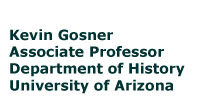

  |
|
Individuals and Societies 103 Spring 2005 World History Since 1500 Instructor: Office Hours: Monday and Wednesday 10:30-12:00 and by appointment Required Texts: William McNeill, Plagues and Peoples. Requirements: Attendance and Participation in Sections (30%; more than 3 unexcused absences will result in no credit). Take-Home Essays: (except as noted, 4-5 pages, typed, double-spaced, 12 pt. font, with citations and footnotes).
Take-Home Map Work (10%: graded pass/fail): Download the outline map and locate the appropriate place name for each question. Completed map assignments are due no later than the dates indicated, but may be turned in earlier.
Late Assignment Policy Unexcused late assignments will be penalized one letter grade; any individual requests for an extension or change of date or time for turning in an assignment should be directed at the teaching assistant and must be made prior to the due date for the assignment.) Code of Academic Integrity: Students are responsible for compliance with all University policies regarding academic integrity http://studpubs.web.arizona.edu/policies/cacaint.htm as well as with American Historical Association standards for historical scholarship http://www.historians.org/governance/pd/Curriculum/plagiarism_intro.htm Schedule of Weekly Topics and Readings: Jan. 12-14: How can we study world history? Jan. 19-21: Do humans have a common history? McNeill: 19-94. Jan. 24-28: What is an empire? Waley-Cohen: 11-55. Jan. 31-Feb. 4: How can we account for the spread of Islam? Dunn: 1-106. Feb. 7-11: How did the Mongols shape medieval history? Dunn: 106-212. Feb. 14-18: How did the Mongols shape modern history? McNeil: 161-207; Dunn: 213-265. Feb. 21-25: How did global forces contribute to the rise of Europe? Thornton: 1-71; McNeill: 210-241. Feb. 28-Mar. 4: What defines colonialism? Thornton: 72-182. Mar. 7-11: What role did religion play in early modern global encounters? Waley-Cohen: 55-92; Thornton: 183-271. Mar. 21-25: What defines modernity? Waley-Cohen: 92-128; McNeill: 242-295. Mar. 28-Apr. 1: How can we understand the “Age of Revolution” as a global phenomenon? Thornton: 272-334; Waley-Cohen: 129-165. Apr. 4-8: How did the Industrial Revolution contribute to the Rise of Modern States? Adas: 6-63; Waley-Cohen: 166-206. Apr. 11-15: What Led to World War I? Adas: 64-123. Apr. 18-22: How did the Great Depression transform the State? Adas: 124-179; Waley-Cohen: 207-246. Apr. 26-29: What were the Origins of the Cold War? Adas: 180-269. May 2-4: Who opposes globalization and why? Adas: 270-383; Waley-Cohen: 247-28 |
||
| |